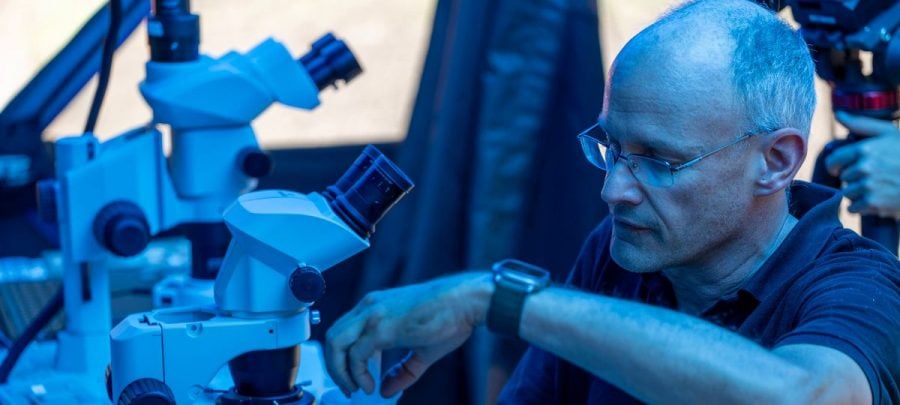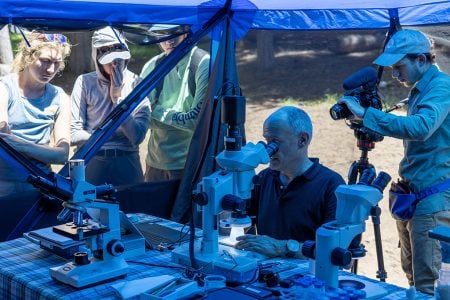
How do you capture microscopic images of miniscule fruit flies when you’re 3,000 miles away from the lab? Grab some popcorn and kick back in the Van Pelt and Opie Library at Michigan Tech to find out.
All the Little Things, a new documentary film featuring the work of genetics and developmental biology professor Thomas Werner will be screened at 2 p.m. on Wednesday, Jan. 22. A Q&A will follow the 40-minute film. Admission is free, the public is invited, and yes, popcorn will be served.
Werner’s love of bugs began when he collected butterflies and moths as a child. He went on to a career as an award-winning instructor and is an authority on North American fruit flies.
“I used to be a really good molecular biologist, and then I turned around when I got bored with that,” said Werner. “Now that I am a full professor I decided to do what my passion really is, and that is to collect fruit flies and to write a gigantic continent-wide guidebook about the fruit flies of North America in four huge volumes.”
To reach his goal, Werner travels thousands of miles to remote environments across the United States collecting fruit flies. His family accompanies him to the campgrounds where he bases his work. His guidebook, The Encyclopedia of North American Drosophilids, includes two volumes (so far): Volume 1: Drosophilids of the Midwest and Northeast and Volume 2: Drosophilids of the Southeast. The book contains high-quality, pristine images of both living fruit flies and dissections, which are impossible to capture without lab equipment and resources.
Werner’s solution for imaging fruit flies is both simple and complex: he brings the lab with him. All necessary lab equipment is packed into a minivan and transported to the latest fruit fly identification site. “I unpack my lab onto a picnic table at the campground and put a tent over it. I can do anything in this lab. I can collect flies, dissect them, and image them,” said Werner.

Werner has been documenting fruit flies using his solar-powered mobile lab since 2022. His ingenuity impressed Stanford postdoctoral scholar Bernard Kim who was also working with fruit flies. Kim came for a firsthand look at the lab on one of Werner’s trips to Washington state. When Kim returned to Stanford and shared what they had seen, it inspired Stanford graduate student and filmmaker Daniel Shaykevich to create a documentary about Werner’s field-lab-hybrid work.
The following year, in 2023, Shaykevich and a crew of six followed Werner to the Pacific Northwest. The documentary covers Werner’s personal and professional journey, including how he trained Stanford students in the art of fruit fly baiting, capture, and identification.
“It was very thrilling. We got along super well with each other. I was so happy to be able to teach those students how to collect fruit flies and so happy that someone documented the process. It was a fantastic experience,” said Werner.
About the College of Sciences and Arts
The College of Sciences and Arts is a global center of academic excellence in the sciences, humanities, and arts for a technological world. Our teacher-scholar model is a foundation for experiential learning, innovative research and scholarship, and civic leadership. The College offers 33 bachelor’s degrees in biological sciences, chemistry, humanities, kinesiology and Integrative physiology, mathematical sciences, physics, psychology and human factors, social sciences, and visual and performing arts. We are home to Michigan Tech’s pre-health professions and ROTC programs. The College offers 25 graduate degrees and certificates. We conduct approximately $12 million in externally funded research in health and wellness, sustainability and resiliency, and the human-technology frontier.
Follow the College on Facebook, Instagram, LinkedIn, X and the CSA blog. Questions? Contact us at csa@mtu.edu.